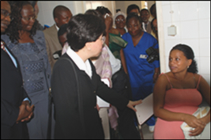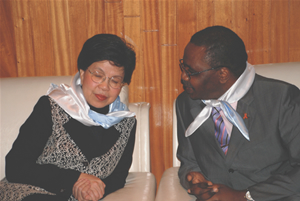Director-General's visit to Angola

Luanda, 18 February 2008 -- The WHO Director-General, Dr. Margaret Chan, said she is very satisfied with the high commitment showed by the Angolan authorities to rebuild the national health system as a «dorsal backbone» of the country. Dr. Chan also made a strong appeal for the improvement of maternal and child health, and the control of communicable, non communicable and neglected tropical diseases in the country.
The WHO Director-General made this statement during her briefings with the national health authorities and visit to health facilities that are delivering primary health care to communities in the Luanda province.
Dr. Margaret Chan has been in Luanda since Sunday, 17th February, accompanied by the Regional Director for Africa. Dr. Luis Gomes Sambo, for a three-day visit to Angola aimed at reinforcing the technical cooperation between WHO and Angola.
The visit started with a meeting in the Ministry of Health during which she was informed about the problems and challenges of the health sector in the country, with emphasis on the burden of communicable diseases (malaria, HIV/AIDS and Tuberculosis), diarrhoeal diseases, acute respiratory diseases, training of the human resources and the rebuilding of health network.
“Angola will grow up, Angola will go straight to economic development, but we hope this development could bring a better health for all the Angolans”, stated Dr. Anastácio Sicato, the Minister of Health, when welcoming the Director-General’s delegation.
Participants at the meeting included the Minister of Health, Dr. Anastácio Sicato, Deputy-Ministers for Public Heath and for hospitals, Dr. José Van-Dúnem and Dr. Evelize Frestas, respectively, the National Health Programme Managers, National Directors from Ministry of Health, a representative from the Ministry of External Relations, the WHO Representative in Angola and the WHO technical staff in Angola.
When presenting the health profile of the country, the Deputy Minister for Public Health said that the increase in the price of petroleum enabled economic growth in Angola, and a bigger commitment for the revitalization of the primary health care in the most populated areas, within the municipalities. “The key points of our strategy for the revitalization of the national health system are health financing, decentralization at municipal level, the delivery of an integrated health package to communities, equity in health and the use of mobile and advanced health teams to provide health services”, he explained.
The Deputy-Minister for Public Health also mentioned the improvement of the national health information system, the strengthening of institutional capacity, the integrated disease surveillance and rapid response system and the access to primary health care with emphasis on maternal and child services as the main health challenges.

In her remarks, the WHO Director-General was very pleased with the high political commitment to tackle health challenges in Angola. “I am very proud to see the efforts to address the main health challenges and to rebuild the national health system after more than 30 years of war in Angola”, she said. Dr Chan also encouraged the national authorities in Angola to continue to pay more attention to the health workers at peripheral level, including
midwives and nurses, as well as the health structures, financial resources and technology.
During her visit to the primary health care facilities the Director-General witnessed the impact of malaria as a main public health threat in Angola, specially among pregnant women and children under five years.
Speaking to health care providers and health services users in the Augusto Ngangula Maternal Hospital in Luanda, the Director-General advocated for the reinforcement of existing strategies for malaria control, such as increased use of impregnated mosquito nets to 80% of coverage at municipal level, the education of the communities to protect themselves against malaria, and the correct use of the artimisinin-based combination therapy as well as the intermittent prophylactic treatment of malaria among pregnant women. “These interventions have shown their efficacy in malaria control and will decrease the burden of malaria very drastically if implemented correctly”, she underlined.
Addressing a national meeting on “Malaria Indicators in Angola”, with the participation of relevant partners from the UN system, USAID, political leaders and other stakeholders, the WHO Director-General thanked the U.S. Presidential Malaria Initiative and appealed for the reinforcement of partnership to fight this killer disease, as well as a higher political commitment in the implementation of the appropriate strategies for its control.
Dr. Margaret Chan is from the People's Republic of China and became WHO Director-General in November 2006.
For more information contact: Issued by WHO Office in Angola.
For further information please contact
WHO Office in Luanda, Angola,
at Rua Major Kahangulo 197, 7 andar,
or
telephone: (244) 222 395 701
Fax: (244) 222 332314 -
E-Mail: wr [at] ao.afro.who.int (wr[at]ao[dot]afro[dot]who[dot]int)


